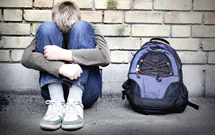
President Barack Obama paved the way for victims of cyber bullying and their families to speak candidly about how school bullying has affected their lives in profound ways at a conference that focused on how adults and students can combat harassment in school and via technology.
Obama smiled when he said his large ears and funny name once made him a target of school-yard harassment. But he was all seriousness when he told the audience at a March 10 White House conference on bullying that torment and intimidation must not be tolerated.
The issue has been getting more attention partly because texting, Facebook, Twitter, and other technologies are being used to carry it out, and because of media coverage of teens who have killed themselves after such taunting and bullying in school.
More on bullying and cyber bullying prevention:
Federal officials aim to prevent bullying
Families of some of those youngsters joined Obama at the White House, including Tina Meier, of suburban St. Louis. Meier’s 13-year-old daughter, Megan, hanged herself in 2006 after falling victim to an internet hoax carried out, in part, by an adult neighbor who posed as a boy. The neighbor, a woman, was later convicted of a federal misdemeanor in a landmark cyber bullying trial.
“No family should have to go through what these families have gone through,” Obama said. “No child should feel that alone.”
Meier had a message for parents who want to take away their children’s computers and other electronic devices to spare them from school bullying and cyber bullying: It won’t work. She urged them instead to get a better understanding of what their kids are doing.
“Technology is out there. We cannot shut it off. Children are not going to allow it to be shut off,” Meier told participants. “We have to make sure that we have parents who understand what’s going on in their child’s online world, as well as the real world.”
Some 13 million students, about a third of all those attending school, are bullied every year, the White House said. Experts say that puts them at greater risk of falling behind in their studies, abusing drugs or alcohol, or suffering mental or other health problems. Kids who are seen as different because of their race, clothes, disability, or sexual orientation are more likely to suffer school bullying.
“If there’s one goal of this conference,” Obama said, “it’s to dispel the myth that bullying is just a harmless rite of passage or an inevitable part of growing up. It’s not.” He spoke to more than 100 parents, students, teachers, and others gathered to discuss the problem and share ideas for solutions.
“Bullying can have destructive consequences for our young people. And it’s not something we have to accept,” he said while announcing a new federal website, www.stopbullying.gov, aimed at addressing the issue.
Speaking as a parent and as a victim, Obama urged everyone to help end school bullying by working to create an atmosphere at school where children feel safe and feel like they belong. He said that even he felt out of place growing up.
“I have to say, with big ears and the name that I have, I wasn’t immune,” said Obama, who moved around a lot as a boy, being born in Hawaii and growing up there and in Indonesia. “I didn’t emerge unscathed,” he said.
Obama said adults have too often turned a blind eye to the problem by chalking up the harassment to kids being kids. But he said a national attitude adjustment is in order because of the damage that bullying can do.
A White House conference doesn’t immediately solve any problem. But what it does do, particularly by involving the president, is tell the country that an issue is, in fact, a problem that requires a national response.
In the case of bullying, the conference also gave Obama another chance to press his education agenda. He has tried to make bullying a part of that by warning that failure to address the behavior puts the U.S. at risk of falling behind other countries academically.
Before breaking into smaller groups, conference participants heard from experts who study bullying. Discussions in the breakout sessions touched on anti-bullying efforts in schools, communities, and on campuses, as well as on cyber bullying. Two other sessions were conducted online, including one with Health and Human Services Secretary Kathleen Sebelius answering questions.
First Lady Michelle Obama said parents need to be more involved in their children’s lives, their schools, and their activities because youngsters “don’t always tell us every little detail.”
She said her youngest daughter, 9-year-old Sasha, often says “Nothing” in response to questions about her day at school.
The first lady, who introduced the president, also urged adults to set an example by treating others with compassion and respect, and giving each other the benefit of the doubt. “It sends a message to our kids about how they treat others,” she said.
More on bullying and cyber bullying prevention:
Federal officials aim to prevent bullying
- ‘Buyer’s remorse’ dogging Common Core rollout - October 30, 2014
- Calif. law targets social media monitoring of students - October 2, 2014
- Elementary world language instruction - September 25, 2014


Comments are closed.